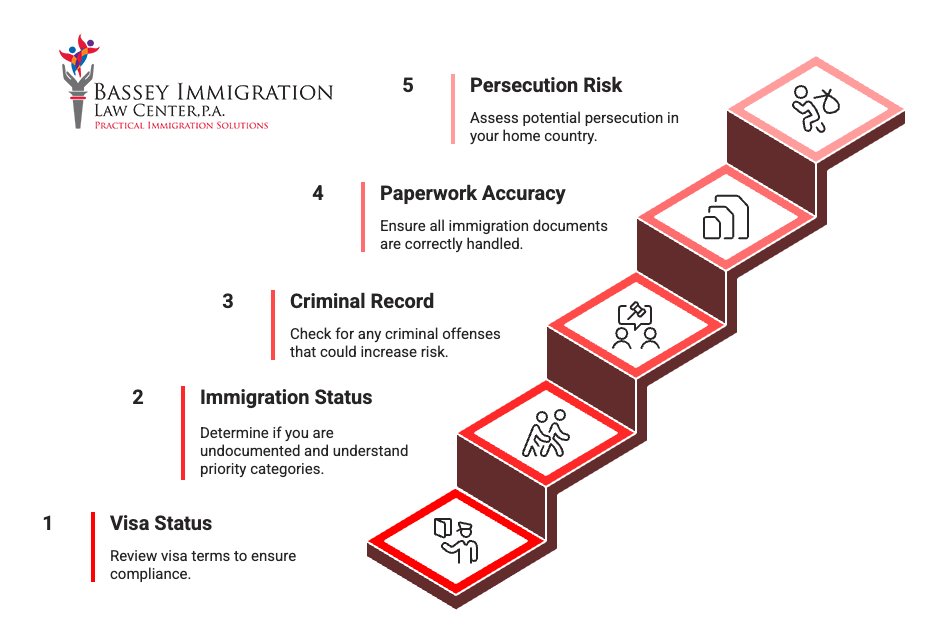How Can I Determine If I Am At Risk Of Deportation?
You can gauge your risk of being deported by assessing your immigration status and the terms of your visa. For example, you have an F1 student visa but didn’t apply for a renewal. Other risks include having a criminal record or failing to disclose a change of address, among others. By thoroughly analyzing your circumstances, an experienced deportation and removal defense lawyer at Bassey Immigration Law Center can help you better understand the risks you face. With law offices in Tampa and Clearwater, we are a trusted source of immigration law throughout Florida. Schedule an affordable consultation today.
How Florida’s Immigration Law Affects Deportation Risks
In 2022, Florida passed SB 1808, mandating that all law enforcement agencies operating county detention facilities enter into 287(g) agreements with ICE. This program allows local officers to perform certain immigration enforcement functions, such as identifying and processing individuals for removal while in custody.
Recent Legislative Developments
On February 13, 2025, Governor Ron DeSantis signed into law Senate Bills 2-C and 4-C, further tightening immigration enforcement:
- SB 2-C: This law prohibits issuing driver’s licenses or identification cards to undocumented immigrants and repeals in-state tuition benefits for students lacking lawful status.
- SB 4-C: This legislation criminalizes the act of knowingly entering Florida as an undocumented immigrant, classifying it as a first-degree misdemeanor. It also mandates the death penalty for undocumented individuals convicted of capital felonies, a provision that is expected to face legal challenges.
SB 1718: Criminalizing Support for Undocumented Immigrants
Enacted in 2023, SB 1718 imposes criminal penalties on individuals who knowingly transport undocumented immigrants into Florida. Specifically, it classifies such transportation as a third-degree felony, with enhanced penalties for multiple offenses or if minors are involved.
Law Enforcement Cooperation with ICE
Under these laws, Florida law enforcement agencies, including the Florida Department of Law Enforcement (FDLE) and the Florida Highway Patrol, are required to cooperate with ICE. This cooperation includes sharing information about individuals’ immigration status and honoring ICE detainer requests.
5 Questions to Assess Your Deportation Risk

To assess your risk of deportation, it can be helpful to ask yourself the following questions:
- What is the status of my visa? Overstaying a visa is one of the main reasons people get deported from the U.S. Carefully review the terms of your visa, including duration of stay, work requirements, and renewal and extension guidelines, to determine if you are in compliance.
- Am I an undocumented immigrant? Anyone who enters the U.S. without proper authorization is at risk of deportation. In 2021, Homeland Security Secretary Alejandro Mayorkas said, “immigration officers can no longer detain and deport people from the U.S. solely because they are undocumented.” However, the new guidelines mandate a case-by-case assessment of individuals to determine if they fall under priority categories.
- Is my criminal record clean? Any criminal offense on your record can place you at a higher risk of deportation. Certain aggravated felonies can result in expedited removal. A minor offense may not warrant deportation, but it could draw unwanted attention from immigration authorities.
- Was your immigration paperwork properly handled? Mistakes or misrepresentations in a visa application, petition for adjustment of status, and other paperwork can not only derail your immigration goals but also place you at risk of deportation.
- Do I face persecution in my home country? The circumstances you would face if you returned to your home country could affect your risk of deportation. For example, you may be eligible for asylum if you face persecution due to race, religion, class, gender, nationality, or political affiliation.
Consult with a knowledgeable deportation attorney in Tampa, FL, who can review the unique circumstances of your case and offer advice and guidance.
I Am at Risk: Now What?
If you determine you are at risk of deportation, do not panic, but ensure you make sound, informed decisions going forward. Learn about immigration laws and how they affect you. Reach out to trusted friends, family members, and advocacy groups who have your best interests in mind. Begin collecting documentation that can shine a favorable light on you if your case should end up in an immigration court.
Most importantly, be proactive and contact an experienced immigration lawyer as soon as possible. They can help assess your risk of deportation and explore strategies for lowering or eliminating that risk. They can also help you advance your immigration status, whether extending a visa, obtaining a waiver, or seeking an adjustment of status.
How to Check Your Immigration Status and Pending Removal Orders
You can check your immigration case status and any pending removal orders through the Executive Office for Immigration Review’s (EOIR) Automated Case Information System (ACIS).
To access your case information, you’ll need your A-Number, an eight- or nine-digit identification number assigned by immigration authorities. When entering your A-Number into the system, do not include the letter “A.” If your A-Number has eight digits, you should add a leading zero to make it a nine-digit number (e.g., enter “012345678” instead of “12345678”).
You can also review your immigration case status online through the U.S. Citizenship and Immigration Services (USCIS ) website. To do so, you will need your unique 13-character receipt number, which is issued when USCIS receives your application or petition.
Common Triggers for ICE Enforcement Actions
The U.S. Immigration and Customs Enforcement (ICE) targets employers suspected of hiring undocumented workers, focusing on industries where unauthorized employment is more prevalent.
Frequently targeted sectors include:
- Agriculture
- Construction
- Hospitality
- Healthcare
- Manufacturing
- Meat and poultry processing
- Restaurants
In addition to workplace raids, ICE or Florida law enforcement, under the 287(g) program of the Immigration and Nationality Act, may ask about immigration status during routine traffic stops.
What Happens If You Are Arrested and ICE Issues a Detainer Request?
If you are arrested and ICE believes you may be removable from the United States, it can issue an immigration detainer—also known as an ICE hold—requesting that the jail or law enforcement agency notify ICE before releasing you. ICE may also ask that the agency hold you for up to 48 additional hours (excluding weekends and holidays) after your scheduled release to allow federal agents time to take custody.
Detainers Are Not Legally Binding Orders
However, it’s important to understand that ICE detainers are not legally binding orders but voluntary requests under federal regulation. Whether local law enforcement complies depends on local policy. Some jurisdictions honor detainers routinely, while others may require a judicial warrant to continue holding someone past their release time.
If you are subject to a detainer, you still have legal rights. You may challenge the detainer—especially if you believe it was issued in error or results in unlawful detention—and seek legal relief from removal, depending on your immigration history and circumstances.
Schedule a Consultation if You Are at Risk of Deportation
The threat of deportation can be frightening, but our experienced legal team can help you understand all the legal options available. At Bassey Immigration Law Center, we have over a decade of legal experience resolving many challenging immigration issues. Our multilingual team fully understands the immigrant experience and knows how to successfully fight for your future. Contact us today to discuss your concerns in a confidential, affordable consultation.
About Bassey Immigration Law Center, P.A.
Bassey Immigration Law Center, P.A., led by attorney Aniefiok Bassey, provides comprehensive immigration services to individuals, families, and businesses in Florida and beyond. With over 20 years of experience, the firm assists clients with a wide range of immigration matters, from family reunification and green cards to business visas and deportation defense. The diverse, multilingual team is dedicated to supporting clients through the complex immigration process, with a special focus on citizenship, asylum, and LGBTQ+ immigration needs. They offer affordable initial consultations and are committed to delivering personalized, strategic guidance for achieving clients’ immigration goals.


